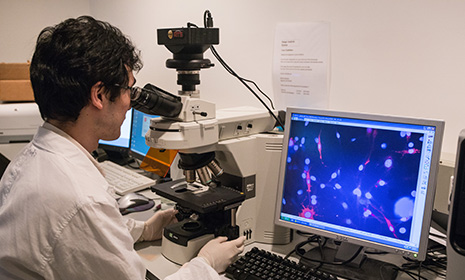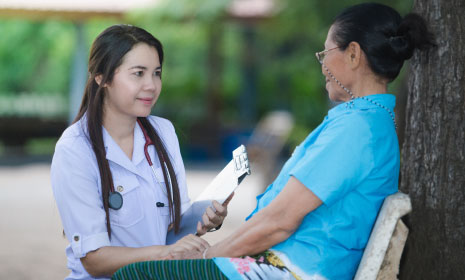Non-communicable diseases in global health
Researchers
| Professor Au Yeung, Shiu Lun Ryan |
Lifestyle and lifecourse epidemiology, and Mendelian randomization |
|
|---|---|---|
| Professor Bishai, David Makram |
Health economics, public health systems, primary health care |
|
| Professor Chen, Shanquan Shaun |
Mental Health; Dementia; Digital Health; Machine Learning (ML) and Artificial Intelligence (AI) |
|
| Professor Espinoza, Manuel Antonio |
Health economic evaluation, health technology assessment, priority setting for resource allocation in healthcare |
|
| Professor Grépin, Karen (On Leave) |
Health services research, comparative health systems and health financing |
|
| Professor Kim, Youngwon |
Physical activity epidemiology and measurement |
|
| Professor Lam, Wing Tak Wendy |
Behavioural health and psycho-oncology |
|
| Professor Leung, Sze Man Kathy |
Cancer epidemiology, cancer screening, health economics |
|
| Professor Liao, Qiuyan Julie |
Risk communication, public risk perception and behavioural decision-making |
|
| Professor Montero, David |
Integrative physiology and impact of lifestyle interventions |
|
| Professor Ni, Yuxuan Michael |
Lifestyle and lifecourse epidemiology and psychiatric epidemiology |
|
| Professor Pedišić, Željko |
Time-use epidemiology, measurement methods, and applied statistics |
|
| Professor Quan, Jianchao |
Health policy, economics and health care services |
|
| Professor Siu, Ming Fai Parco |
Exercise physiology and muscle biology |
|
| Professor Tian, Linwei |
Environmental epidemiology |
|
| Professor Wu, Tsz Kei Joseph |
Cancer epidemiology, cancer screening, health economics |
|
| Professor Zhao, Jie Jane |
Lifestyle and lifecourse epidemiology and intervention |
|
South East Asia, and Hong Kong specifically, provides a contextually specific setting from which to gain a better understanding of non-communicable chronic diseases in global health. Disease patterns in Hong Kong challenge prevailing wisdom about traditional cardiovascular and diabetes disease risk factors. As the most developed, westernized and over-crowded city of China, Hong Kong provides golden opportunities for trials of preventive interventions on both communicable and non-communicable diseases. Hong Kong is a sentinel for China and other South East Asian populations currently experiencing rapid economic development and globalisation. Our research programme has fourteen foci:
- Advanced epidemiology and statistical research methods
- Applied to four active cohorts spanning the life course to confirm or refute empirically driven hypotheses in a unique setting
- Emphasising innovative theoretical methods and models for population health (Mendelian randomisation, instrumental variable analysis, mathematical modelling of health services utilisation, neural networks, partial least squares, latent growth modelling and clinical decision analysis)
- Causes of and interventions for non-communicable diseases prevention and treatment
- Childhood experiences, growth patterns, and body composition
- Family dynamics and lifestyle choices
- Air pollution and climate change
- The microbiome
- Social disparities
- Smoking, alcohol, healthy living, and aging
- Population mental health
- Cross-national and global mental health
- Psychobehavioural responses to population events
- Promotion of mental wellbeing and the prevention of mental health disorders
- Inter- and intra-generational effects on health
- Evaluation of population level screening policies
- Cost effectiveness of cancer screening programmes
- Cost effectiveness of vaccine programmes
- Identification of new interventions to prevent non-communicable diseases
- The role of hormones
- Population risk perception
- Health behaviour change and simple interventions
- Socio-economic patterning of non-communicable diseases in South East Asian populations
- Drivers of long-term trends
- Application of evolutionary biology to inform public health interventions
- Non-communicable disease impact on local and regional health service utilisation and health policy
- Economic costs of service provision
- Role of manpower planning and inter-professional work in service delivery models
- Financial models for healthcare service delivery and their impact on health in Hong Kong and in China
- Political-economic, social and personal factors
- Physical activity and health
- Exercise physiology and health sciences
- Physiological responses to high-intensity exercise and physical inactivity
- Health benefits and the underlying mechanisms of mind-body exercise
- Physical activity epidemiology and measurement
- Role of physical activity in modifying the genetic risk of chronic diseases
- Use of wearables and genomic technologies in promoting physical activity
- Physical activity and exercise in children
- Physiological determinants of cardiorespiratory fitness
- Exercise physiology and health sciences
- Skill learning and expert performance
- Motor learning and performance
- Perception and performance in expert and novice populations
- Movement rehabilitation
- Motor learning and performance
- Psycho-oncology
- The contribution of cognitive bias to psychological distress in clinical population
- The role of negative meta-cognitive beliefs, intolerance of uncertainty and interoceptive attention in fear of cancer recurrence
- Cancer survivorship and fear of cancer recurrence
- Doctor-patient communication and decision-making
- Symptom burden and its impact of cancer rehabilitation
- Research on the implementation of psychosocial and behavioural interventions in cancer care
- Bioinformatics and cancer biostatistics
- Big data analytics
- Biomarker discovery
- Machine learning
- Public health genetics and genomics
- Risk communication, risk perception and public health
- Vaccine confidence
- Vaccine confidence
- Approaches to health care delivery for patients with chronic illnesses








.png)
